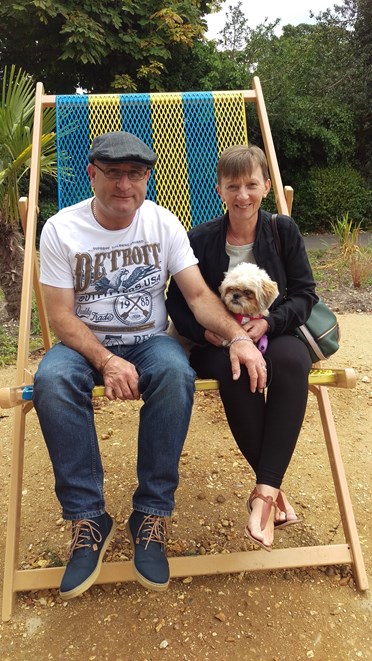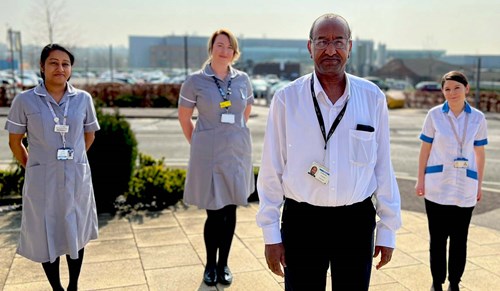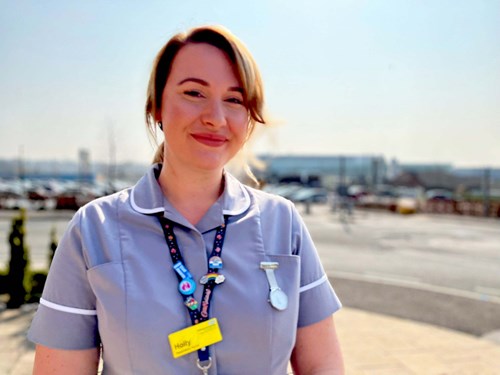Asthma patients praise groundbreaking treatment


Karen Moseley with husband John
Asthma patients from Stoke-on-Trent have spoken about the “life-changing” effect of asthma biologics. The groundbreaking treatment is being offered to patients as part of a pilot programme at University Hospitals of North Midlands NHS Trust (UHNM) and works by blocking allergic pathways in the body. Patients who suffer with a severe form of the debilitating condition have described the “phenomenal” difference in their quality of life as a result of the treatment.
The number of people with asthma in Stoke on Trent is above the national average for the UK.
63-yer-old Karen Moseley, of Penkhull, has been on asthma biologics for just over a year.
Before moving to the UK to be with husband John, Karen lived on a ranch in California. It was there that she developed a lung infection known as Valley Fever, later leading to a diagnosis of asthma.
Karen said: “At first things weren’t so bad because it’s dry in California, but when I came to the UK where it’s more damp I started having problems and was eventually diagnosed with eosinophilic asthma.
“Prior to starting treatment I was on oral steroids for eight out of 12 months of the year. I constantly suffered with chest infections, then I’d perhaps have two weeks before it would start all over again. I was on three inhalers, using nose sprays and steroids, all with no real relief. I stopped exercising because I felt so terrible and this made me put on weight. I couldn’t really do anything, I would just end up lying on the sofa all day and was unable to make plans with my friends or do anything.
“When the team at Royal Stoke contacted me to ask if I would be happy to try something new, I jumped at the chance.
“I’ve now been on the treatment for just over a year now and the change in my life has been amazing, just phenomenal. I can go walking with my friends, I’m exercising and I almost never have to use my rescue inhaler.
“I feel like a new person, I have only had to have two courses of steroids in the last two years, which compared to before is absolutely unbelievable. I have only used my nebuliser at home twice since starting, whereas before it was all the time.
“Before I never felt able to commit to anything and was always having to cancel plans, but now I can actually look forward to things. I’m able to lose weight because I can get out and exercise and I’ve been able to meet up with my friends to go for a walk.
“I haven’t had any trips to A&E either, whereas before I was having to go frequently.
“I used to live in absolute terror of Covid and had been on the clinically extremely vulnerable list from the beginning of the pandemic, but I actually got it a few weeks ago and although I felt unwell, my symptoms were less severe than my husband’s, who doesn’t have a respiratory condition. I feel the treatment made a huge difference to how my body dealt with it.
“I love singing and I’m part of a local choir. Before the treatment I was struggling to sing a whole line of music without taking one or two breaths, but not now I can control my breathing better and sustain a note.
“I also love crafting and I’ve been able to get out to sell my work at a local market.”
“Other than a few headaches when I initially started the treatment, I have experienced no side effects at all. I am able to self-administer my medication via a quick and simple injection. There’s no pain with it, it’s really easy to do and it hurts less than a finger-prick test for a blood sample.
“I couldn’t encourage people enough to try this new treatment if it’s offered, there’s nothing to lose but everything to gain.”
Karen, a self-confessed ‘Anglophile’, has been in the UK for 23 years and also enjoys reading Jane Austen and exploring English history.
Approximately three people die from asthma each day in the UK, with 20 million working days lost each year.

Paul Wilberforce with his partner Dawn Garnham
60-year-old Paul Wilberforce, an NHS 111 trainer from Stoke, started with asthma at the age of seven.
Today, Paul said: “I didn’t have any control over things before, I was taking medication regularly and I could have an attack at any time.
“I have agaoraphobia and just the blind panic of going out could bring on an asthma attack. Now after nine months on the treatment I feel so much more secure and have peace of mind.
“My asthma has gotten much worse over the last ten years. It was actually my family who noticed how much worse my breathing was getting. I was so used to it that I hadn’t realised. Before on the phone I’d have to keep stopping to take a breath but now I can have a conversation and they can actually understand what I’m saying.
“Just walking up the stairs used to be too much, but now I can run up the stairs at work!
“The asthma team at Royal Stoke have been absolutely superb. You can talk to them about anything, they are worth their weight in gold.
“Normally this time of year I’d be crippled with hay fever but that actually seems better as well. Spring is always the very worst time, but so far this year there’s nothing.
“To anyone offered this treatment I would say go for it, give it a try. If it changes one person’s life like it’s changed mine, it’s worth it.
“The future is definitely looking better.”
Paul lives with partner Dawn Garnham and enjoys golfing and biking in his spare time.
Asthma biologics work by assisting the body’s immune-response function. They are a form of specialist treatment which use antibodies to target specific cells in the body.

Members of the asthma team at UHNM
Holly Minshall, asthma nurse educator, will be working with GP practices across Stoke on Trent and Staffordshire to help clinicians identify patients who could benefit from the treatment.
Holly said: “We feel confident that giving patients access to asthma biologics will really enhance their quality of life. They will have more control over their condition and they will also have to spend less time at their doctor’s and at the hospital.
“Severe asthma can be absolutely devastating and means that in many cases a person’s life is dominated by the condition. They are constantly going to the doctors, taking steroids and using inhalers.

Holly Minshall, asthma nurse educator
“In some cases severe asthma can develop in a person in their 30’s who until that point was completely healthy. Patients can go from living completely normal lives to not being able to go to work, play with their children or socialise.
“Although biologics have been around for a while to treat other inflammatory diseases, their use in treating asthma is still fairly new and not common. We are really excited about being able to offer our patients this new treatment which could really give them a new lease of life.
“Every time blue inhalers are used they emit CO2 into the atmosphere, so we also hope that the use of asthma biologics will have a beneficial effect on the climate, as the need for inhalers will be reduced.”